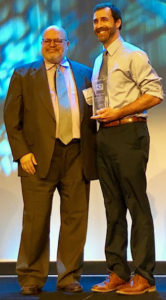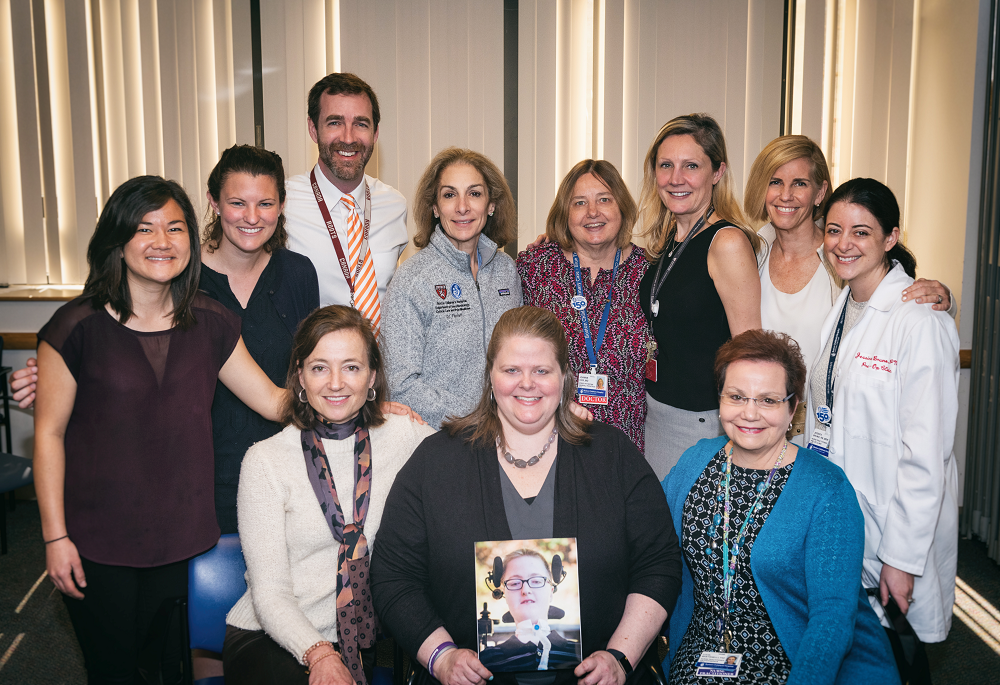

Scott Wallace, vice president of sales operations for Taylor Healthcare (left), presents the Sherman Award to Jay Berry, MD, of the Perioperative Complex Spine Surgery Team at Boston Children’s Hospital.
Editor’s note: The Perioperative Complex Spine Surgery Team at Boston Children’s Hospital received a 2019 Sherman Award for Excellence in Patient Engagement for reengineering the perioperative process for children with complex medical conditions. The results improved communication and coordination among family members and care teams. The group from Boston Children’s and other awardees were recognized for their accomplishments during a ceremony at the Institute for Healthcare Improvement’s Patient Safety Congress in Houston, Texas, on May 16, 2019.
The aim of our program is to reengineer perioperative care for high-risk surgeries in children with medical complexity (CMC) so that the children and their families experience the safest, most reliable, patient-and-family-centered and successful transit through the pre-, intra- and postoperative phases of care. Children with neuromuscular scoliosis undergoing spinal fusion have been our initial focus because of the children’s frailty, protracted recovery and high post-operative complication rates. With patients and families at the center of our work, we integrated health system engineers, health services researchers, and clinical stakeholders (surgeons, anesthesiologists, general pediatricians, specialists, nurses, administrators, etc.) to:
1) assess current perioperative care processes, structure and outcomes; and
2) design and implement the ideal perioperative workflow that best serves patients and families.
Parents Catalyze the Process
Erin Ward and Lucia Bastianelli – two amazing parents of children who underwent spinal fusion – were the prime catalysts for the design and vision of the project. They’ve been full partners throughout, generating ideas and implementing feasible solutions to improve care. Bastianelli, a nurse, integrated clinically with the project, providing direct care to patients experiencing the reengineered process. In addition, we partnered closely with parent Blyth Lord and her national Courageous Parents Network (CPN), an online education hub to assist families of children with medical complexity with challenging medical decisions, including whether to pursue spinal fusion. Lord integrated with Ward and Bastianelli to help create a shared-decision making guide for spine surgery, which is posted on the CPN website.
With significant patient and family guidance, we engineered multiple core processes into perioperative care, including 1) proactive communication from the surgeons to the child’s other providers about the need for spinal fusion; 2) patient chart review and phone call by a complex care / general pediatrician and advanced practice nurse (APN) for screening of past medical history, quality of life and functioning; 3) outpatient visit for comprehensive health assessment with identification of risks, shared decision making about surgery and perioperative planning; and 4) multidisciplinary team meetings to assess whether to proceed with surgery and finalize surgical readiness.
To date, nearly one-hundred patients and families have experienced the revised perioperative workflow. The median number of organ systems affected by the children’s co-existing chronic conditions was 5 (IQR 4-5). The median number of perioperative health issues addressed from the comprehensive health assessment to help optimize the children’s perioperative health and safety was 4 (IQR 4-5). Children with a comprehensive health assessment required less last-minute work by anesthesiology for surgery clearance. Pre-operative general pediatrics involvement was associated with shorter length of hospital stay for surgery as well as decreased hospital costs.
Most importantly, families have been highly satisfied with the perioperative process. One parent commented, “Thank you all for giving me my son back. I haven’t seen his smile in years and honestly never thought I would see it again.” Another family said, “[Our Dr.] was great because we spoke on the phone for at least an hour, and he really understood all of [my child’s] different medical issues, and anything that would possibly come up…I walked him through what it’s like every day with [my child] and what it’s like with her special needs, and it’s pretty obvious that all the information was relayed because everybody has put all that in place [for surgery].”
Regarding sustainability, our project to reengineer perioperative care for high-risk surgeries in children with medical complexity has received funding support from the Agency for Healthcare Research and Quality. Because of the project’s impact on our patients and families, the hospital is helping to hardwire the new clinical re-design into standard practice. In addition, the success of our perioperative work has led to 1) two peer-reviewed publications in Pediatrics, 2) national presentations at the American Academy of Cerebral Palsy and Developmental Medicine (AACPDM) Conference, 3) spread of our patient and family-centered perioperative model to additional surgeries; and 4) the development of an international patient-and-family-centered care pathway on preparing children with neuromuscular scoliosis for spinal fusion. This pathway, sponsored by the AACPDM, will be publicly available to families and providers in the Fall 2019. Our patient and family partners deserve the credit for our project’s success and sustainability!





